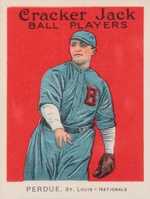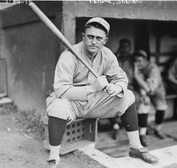
The Miracle Braves of 1914: Boston's Original Worst-to-First World Series Champions - Bill Nowlin, Bob Brady, Charles F. Faber, Jack V. Morris, Chip Greene, Peter Bjarkman, Wayne McElreavy, Maurice Bouchard, Jim Elfers, Greg Erion SABR, Inc., Apr 2, 2014 - 398 pages
Hub Perdue - By Alan SImpson

ALTHOUGH HE ANSWERED to a variety of nick-names — Rub-Dub-Hub, Hurling Hub, the Tennessee Cyclone, the Untamed Son of Sumner County, the Gallatin Squash— his family, friends, and baseball fans simply called him Hub. Herbert Rodney Perdue was one of the most personable and exciting pitching prospects to emerge from the hills of Middle Tennessee in the first decade of the 20th century. Perdue exhibited a light-hearted personality on and off the baseball field that concerned contemporary critics. Yet, his time in baseball overlapped the entire Deadball Era , (1900-1923) and he set one professional pitching record that has stood for practically a century.
Perdue's second tour in the Sauthern Association (1917- 1921) started less than a week after his dismissal from Louisville when he signed with Kid Elberfeld's Chattanooga Lookouts. Surprisingly, there were no public outbursts between the volatile Tabasco Kid and the jocular Gallatin Squash. From the outset, Elberfeld gave Perdue the ball every fifth day throughout the season and he missed only one start, The Kid was determined to squeeze every ounce of baseball out of Perdue before he expired, and the results were quite impressive-15 wins (second on staff), 2V innings pitched (fourth), 1.95 ERA (first), and 1.07 WHIP (second). For once, Perdue had finished a season strongly in winning his final seven of eight games. Had Perdue reinvented himself?
As the country's involvement in the Great War escalated in 1918,Perdue signed with the New Orleans Pelicans, who reportedly made him the highest paid pitcher in the Southern circuit. Reunited with manager Johnny Dobbs, Hub responded positively to the high expectations placed upon him. When the league shut do wn on June 28 owing to the government's "work or fight" policy, Perdue led the league with 12 mound victories and secured his sixth team championship.
Perdue's second tour in the Sauthern Association (1917- 1921) started less than a week after his dismissal from Louisville when he signed with Kid Elberfeld's Chattanooga Lookouts. Surprisingly, there were no public outbursts between the volatile Tabasco Kid and the jocular Gallatin Squash. From the outset, Elberfeld gave Perdue the ball every fifth day throughout the season and he missed only one start, The Kid was determined to squeeze every ounce of baseball out of Perdue before he expired, and the results were quite impressive-15 wins (second on staff), 2V innings pitched (fourth), 1.95 ERA (first), and 1.07 WHIP (second). For once, Perdue had finished a season strongly in winning his final seven of eight games. Had Perdue reinvented himself?
As the country's involvement in the Great War escalated in 1918,Perdue signed with the New Orleans Pelicans, who reportedly made him the highest paid pitcher in the Southern circuit. Reunited with manager Johnny Dobbs, Hub responded positively to the high expectations placed upon him. When the league shut do wn on June 28 owing to the government's "work or fight" policy, Perdue led the league with 12 mound victories and secured his sixth team championship.



